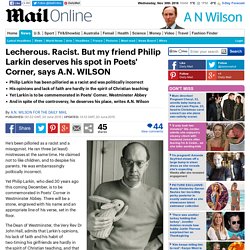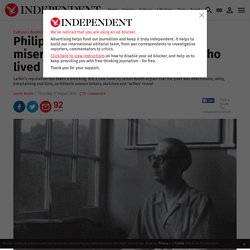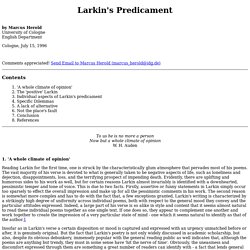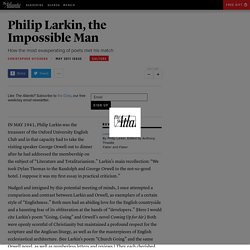

Philip Larkin: Love and Death in Hull. Philip Larkin.Monitor: Down Cemetery Road pt2. They may not mean to, but they do: Part one of the authorised biography of Philip Larkin. Philip Larkin called his childhood 'a forgotten boredom'.

The truth was much stranger: home was 'slightly mad'; his father had Nazi sympathies; his mother's whining monologues left him 'twitching and boiling'. All this, along with the friendships and enthusiasms which he formed at Oxford, and his difficulties with girls, helped to shape his poetry They fuck you up, your mum and dad. They may not mean to, but they do. They fill you with the faults they had And add some extra, just for you. But they were fucked up in their turn By fools in old-style hats and coats, Who half the time were soppy-stern And half at one another's throats.
Man hands on misery to man. It deepens like a coastal shelf. Get out as early as you can, And don't have any kids yourself. Philip Larkin, April 1971 AS SOON as he knew he was going to be Treasurer for the City of Coventry, Sydney Larkin told his wife Eva that the time was right for them to have another child. But in one respect Sydney also became an embarrassment. Philip Larkin deserves his spot in Poets' Corner, says A.N. WILSON Flawed character: Philip Larkin with a toy rabbit in 1964 when the poet was 42 He’s been pilloried as a racist and a misogynist.

He ran three (at least) mistresses at the same time. He claimed not to like children, and to despise his parents. He was embarrassingly politically incorrect. Yet Philip Larkin, who died 30 years ago this coming December, is to be commemorated in Poets’ Corner in Westminster Abbey. The Dean of Westminster, the Very Rev Dr John Hall, admits that Larkin’s opinions, his lack of faith and his habit of two-timing his girlfriends are hardly in the spirit of Christian teaching, and that he was a controversial choice for Poets’ Corner.
Both Betjeman and Hughes were Poets Laureate, which Larkin never was. In spite of all the controversy surrounding him, he undoubtedly deserves his place in the Abbey. It is not as if he will be the only flawed character among the ‘residents’ there. The other day, I walked round Poets’ Corner. Friends: A.N. Philip Larkin: Misogynist, racist, miserable? Or caring, playful man who lived for others? Affection for Philip Larkin's work is almost universal.

He is more frequently quoted than any other poet of his time: "Sexual intercourse began/In nineteen sixty-three"; "What will survive of us is love"; "Never such innocence again", "The sure extinction that we travel to". His poems evoke the widest range of moods, from the heart-warming celebration of The Whitsun Weddings to the bloody-minded zest of Toads; from the yearning of An Arundel Tomb to the despair of Aubade. Larkin's Predicament. By Marcus Herold University of Cologne English Department Cologne, July 15, 1996 Comments appreciated!

Send Email to Marcus Herold (marcus_herold@idg.de) Contents 1. To us he is no more a person Now but a whole climate of opinion W. 1. Reading Larkin for the first time, one is struck by the characteristically glum atmosphere that pervades most of his poems. Insofar as in Larkin's verse a certain disposition or mood is captured and expressed with an urgency unmatched before or after, it is genuinely original. 2. There is a tendency in recent criticism to see Larkin's pessimism in somewhat more relative terms, and to emphazise the affirmative and humorous sides to his work as well. 'First Sight', however, certainly is one of Larkin's most affirmative poems. With 'The Whitsun Weddings', the case is somewhat less unambiguous. Shabnumlarkinpoems1final. Philip Larkin, the Impossible Man. In May 1941, Philip Larkin was the treasurer of the Oxford University English Club and in that capacity had to take the visiting speaker George Orwell out to dinner after he had addressed the membership on the subject of “Literature and Totalitarianism.”

Larkin’s main recollection: “We took Dylan Thomas to the Randolph and George Orwell to the not-so-good hotel. I suppose it was my first essay in practical criticism.” Nudged and intrigued by this potential meeting of minds, I once attempted a comparison and contrast between Larkin and Orwell, as exemplars of a certain style of “Englishness.” Both men had an abiding love for the English countryside and a haunting fear of its obliteration at the hands of “developers.”
(Here I would cite Larkin’s poem “Going, Going” and Orwell’s novel Coming Up for Air.) In somewhat different ways, Orwell and Larkin were phlegmatically pessimistic and at times almost misanthropic, not to say misogynistic. No keen analyst is required to unravel this. Martin Amis on Larkin. Philip Larkin, the Impossible Man. Martin Amis on Larkin. Philip Larkin Bald Grouchy and Old Roddy Lumsden. Philip Larkin Man Myth Juliet Harrison. Larkin Jazz and The Whitsun Weddings Andrew Green.